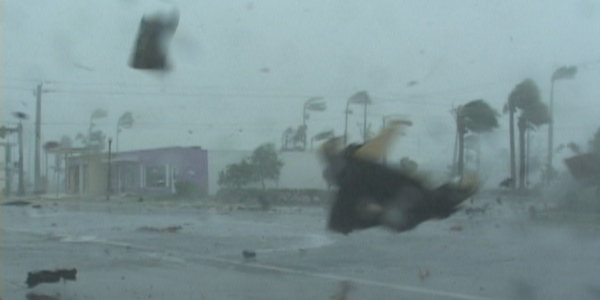If you are one of many who have recently moved to the Sunshine State, there might be a chance you’ve never experienced a tropical storm or hurricane.
Here’s how we prepare for storms, Florida-style.
- Most important – and this comes from personal experience -have a sufficient amount of cash on hand. When the power goes out, that means that ATMs and credit cards typically cannot be processed. No cash means no food and no gasoline for your generator, in many cases. Be sure to have enough to cover a couple of weeks without power.
- Dust off those hurricane panels. It’s been a while since we’ve put up the hurricane panels. Now is a good time to take them out of storage, match them to their respective windows and doors, and make sure you have the proper tools, wing nuts, wing-nut driver or other fittings needed to install the panels before a storm.
- Remove extra yard ornaments and temporary shelters. “I don’t have anything in my yard that I can’t bring indoors by myself quickly,” said Karla Lenfesty, coordinator of the Windstorm Damage Mitigation, Training and Demonstration Center, or Hurricane House, in Fort Pierce. In the days after a storm is forecast, she advised, don’t put yourself in a position of having to choose between cleaning up the yard and putting up storm panels if your time is limited.
- Landscape for Florida: Tree limbs and palm fronds are the most frequent cause of power outages, according to Florida Power & Light, as well as the typical cause of flickering lights. When planting, leave at least 30 feet between power lines and trees that will be large at maturity. Shrubs and low-growing palms and plants can enhance the landscape near utility lines. Keep vines away from lines; they can cause the same problems as trees if left to grow unchecked. If your neighbors have lights and you don’t, it could be trees on your property causing the outage.
- Fire-up the generator. If you have an emergency back-up generator, test it early in case repairs are needed. It is too late for repairs when a storm is forecast. Consider installing a natural gas generator, or changing out your appliances for natural gas-powered ones. You’ll be a little more comfortable if we lose power for any length of time.
- Pet preparations. If not already in the house, get out the pet crates and clean them up. Place them where pets can get used to them. Put your pet evacuation kit in a backpack next to the crate, ready to go at a moment’s notice.
- Make room in the pantry. With each trip to the store, start collecting hurricane supplies including food, water and battery operated lights and radio. Learn what supplies you will need and how to store them.
- Know the important phone numbers. “I think communication is an important concern,” said Catherine Pina, LPN, a nurse with VNA of the Treasure Coast. “I encourage patients to have a written list of numbers just in case there is no power. They are able to communicate with friends and family xoncerned about their safety.”
- Clean up your insurance policies. Insurance coverage cannot be changed when a storm has been named, even if it doesn’t make landfall. Homeowner’s insurance policies do not cover floods and may not cover sinkholes. Some policies don’t cover the full replacement cost of your home. And other policies have high deductibles that the homeowner needs to cover before the insurance company pays. Sit down with your insurance agent to determine if your home or business is sufficiently-covered for hurricane, sinkhole and flood damage.
- Save the swales. Stop parking in the front yard swale and remove trash and debris. St. Lucie County’s ‘Save the swales’ educational campaign explains how to keep roadside swales working properly. Swales are a grassy ditch in the front yard or near a body of water which capture water to slow run-off. Toxins and nutrients may sink into the ground or move on to the canals.
- Just be ready. When a storm is heading this way, be prepared for many scenarios. Remember, not every storm will become a hurricane, and not every hurricane will head straight for the Treasure Coast. But if and when then do, it may quickly become too late to plan ahead. Prepare now … just in case.
Source: TCPalm


